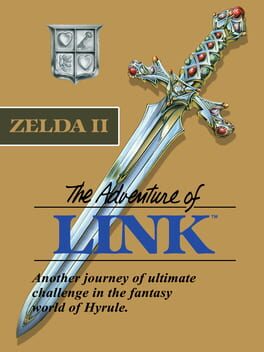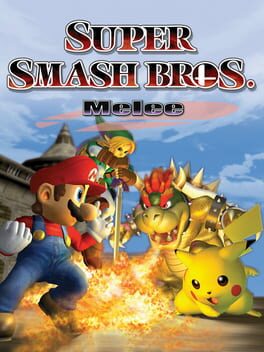MTFF
Bio
My goal is basically to post about little aspects of games that I think other people tend to miss or gloss over. Sometimes this entails contrarianism and sometimes it entails the opposite, but I will try not to let that stuff color the way I write. I've made an exception for Final Fantasy VI because you really do just have to play that one.
My goal is basically to post about little aspects of games that I think other people tend to miss or gloss over. Sometimes this entails contrarianism and sometimes it entails the opposite, but I will try not to let that stuff color the way I write. I've made an exception for Final Fantasy VI because you really do just have to play that one.
Badges

1 Years of Service
Being part of the Backloggd community for 1 year
008
Total Games Played
000
Played in 2024
000
Games Backloggd
Recently Reviewed See More
I never got 120 stars the first time around. After doing so a decade later on the DS port I went back to finish the job, and I have to say I liked that the camera/controls were hindering me a bit.
If that had been a problem for a 70-star Any% (NMG) playthrough that's one thing, but if you're going to go for 100% completion there should be some component with a little drama to it. In this case, that's walking across a narrow platform on Tick Tock Clock or Rainbow Ride with 90 coins. It feels a bit like taking your winnings from the card table and immediately putting it all on black.
I guess you can argue if it makes it a better game, but it does make it that much more exciting when you get the star.
If that had been a problem for a 70-star Any% (NMG) playthrough that's one thing, but if you're going to go for 100% completion there should be some component with a little drama to it. In this case, that's walking across a narrow platform on Tick Tock Clock or Rainbow Ride with 90 coins. It feels a bit like taking your winnings from the card table and immediately putting it all on black.
I guess you can argue if it makes it a better game, but it does make it that much more exciting when you get the star.
The one puzzle that no NPC gives you any hint at is how to fight Iron Knuckles. I think you're supposed to guess at the answer after having seen an entirely different trick work, one that doesn't become available until the third dungeon and is so finicky that you can easily beat the game under the impression that it doesn't work—but they're one of the most common enemies and the game can get miserable if you don't learn how to beat them. I would have said something in the manual.
Other than that Zelda II's only flaw is an overly linear overworld, which is understandable as a reaction to its overly cryptic predecessor. Its dungeon design is unmatched in the series and maybe in the genre. It takes a simple, rewarding, fast combat system and pushes you to engage some enemies while dodging others; what higher praise could I give? The magic and 1-Up systems suggest some interesting routing too.
Other than that Zelda II's only flaw is an overly linear overworld, which is understandable as a reaction to its overly cryptic predecessor. Its dungeon design is unmatched in the series and maybe in the genre. It takes a simple, rewarding, fast combat system and pushes you to engage some enemies while dodging others; what higher praise could I give? The magic and 1-Up systems suggest some interesting routing too.
I don't have anything to add to the general discussion of how it's "the A Link to the Past of multiplayer gaming" and then some. However, I do wish to address the critique that the roster is unbalanced.
It's often remarked with some irony that Melee, despite having spawned a competitive scene with a sky-high skill ceiling and 20 years of at times poorly documented lore, was meant to be the most accessible fighting game. But I think it's true. And part of "accessibility" is not just that can anybody can grasp the standardized input set, but that anybody can find a character that suits them.
Some people's idea of a fun character to play is going to turn out not to be a character that is viable in competitive play.Just look at Falcon. Trying to make those characters viable in competitive play would very likely mean sacrificing what makes them unique, and what makes them appealing to the players who love them.
Maybe whatever archetype or goal Bowser represents cannot win in tournament, and whatever archetype or goal Fox represents will turn out to be strictly better than what any other character can offer. And if the latter actually does happen, we'll reflect that Melee's ultimate downfall as a competitive pursuit was a consequence not of poor design but of the factor that let this game transcend its genre.
It's often remarked with some irony that Melee, despite having spawned a competitive scene with a sky-high skill ceiling and 20 years of at times poorly documented lore, was meant to be the most accessible fighting game. But I think it's true. And part of "accessibility" is not just that can anybody can grasp the standardized input set, but that anybody can find a character that suits them.
Some people's idea of a fun character to play is going to turn out not to be a character that is viable in competitive play.
Maybe whatever archetype or goal Bowser represents cannot win in tournament, and whatever archetype or goal Fox represents will turn out to be strictly better than what any other character can offer. And if the latter actually does happen, we'll reflect that Melee's ultimate downfall as a competitive pursuit was a consequence not of poor design but of the factor that let this game transcend its genre.


